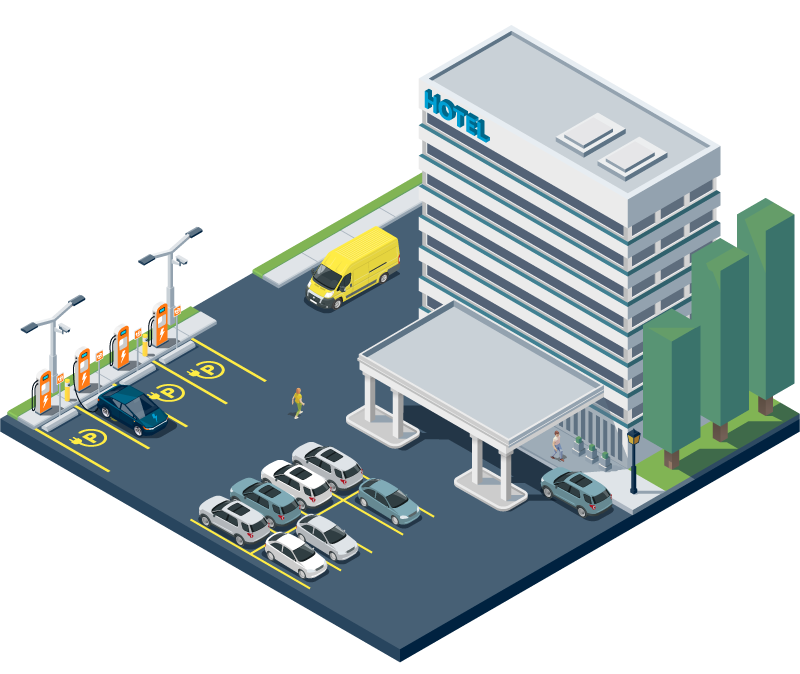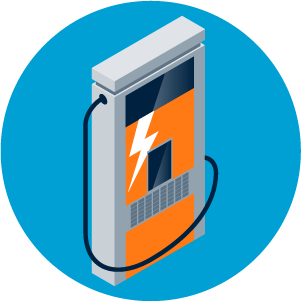Energy and Data Management
Smart energy systems are called “smart” for a reason. Smart systems connect to the internet and transmit data related to their use. Such energy and data management systems include EV charging systems, lighting, security cameras and monitors, and even refrigerators or heating and cooling. Companies can collect data from these systems and use it to drive insights that have never before been possible.
When you connect your electric vehicle (EV) chargers to the internet, they become part of your hotel’s data ecosystem. The data generated from EV charger use—information about energy use, driver behaviors, and much more—help to improve your business intelligence. Ultimately, this information helps you to make better management decisions.
Future Energy offers integrated management software called Interface. Through a centralized dashboard, Interface gives your business visibility into all of the smart systems on each of your properties. Energy and data management through Interface help your hotel to better serve your guests while keeping an eye on energy use and associated costs.
Energy Management in Hotels
Hotels and motels in the US use electricity mostly for office equipment, ventilation, refrigeration, and lighting. Annually, this electricity totals an average of 14 kilowatt-hours (kWh) per square foot.
Utilities primarily charge on the basis of two primary parameters. These include how much total energy you use (consumption) as well as peak demand, which measures the highest energy use for a certain range of time.
Gaining Visibility into Energy Use
You can use energy data to manage costs and gain further insights into your hotel’s power use. This becomes especially critical as you add EV chargers. EV chargers add substantially to a hotel’s electricity use.
A level 2 charger, which runs off a 240-volt circuit and can fully charge an EV overnight, uses from 7 to 19 kW of power. A level 3 charger, or direct-current fast charger (DCFC), runs off three-phase, 480-volt power. It uses up to 350 kW. Without proper energy management, these costs can spiral out of control.
Spreading Energy Use over Time
Interface connects your EV chargers to all of your electrical systems. Because there’s visibility into all power use, Interface can automatically distribute charging load so that you stay beneath peak demand.
For example, you can throttle the output of an individual charger overnight to charge each vehicle more slowly. That way, you spread the load over many hours to stay below peak. Your guests get the same results at a lower cost to you.
Establishing a Balanced Strategy
Interface helps you to meet strategic energy targets, balancing your business needs with energy use. Doing so helps to save significant costs, a Future Energy study found.
A business with four level 2 ports at 12 kW and one DCFC port at 180 kW saves 74% on its annual utility bill versus not managing EV charging. Our study calculated savings based on 120 different tariffs, representing about 80% of the US.
Hotel Operating Costs Breakdown
For greater efficiency, Future Energy recommends establishing a separate infrastructure for your EV chargers. The chargers’ electrical draw doesn’t affect the rest of the hotel’s electrical systems, yet Interface can incorporate EV charging data with smart systems running on other circuits.

Navigating Peak Demand
Utilities measure peak demand for your entire property’s energy use, even if you run separate lines for EV charging and your lighting or other systems. If you inadvertently exceed your peak demand, you can affect your electricity rates for the entire year. The key to managing energy costs is visibility into your usage.
Automation Strategies
Your hotel’s EV charging operating costs are a complex configuration that incorporates much more than simple cost per kilowatt. Interface automates energy management strategies for Future Energy clients through algorithms with parameters that are customized for your business.
Through Interface, your business can coordinate on and off times for EV charging, manage demand, and control cost by balancing electricity use among systems.
Cutting Costs through Energy and Data Management
Future Energy’s study found savings for companies that use Interface’s energy management algorithms. For a hotel operating four level 2 EV charging ports at 12 kW and one DCFC port at 180 kW, the 74% savings translates to significant dollars. Considering 120 tariffs across the US, the 74% adds up to more than $24,000 in savings annually.
Even hotels with different EV charger profiles save through the use of Future Energy’s customized automations and other energy management strategies. In the big picture, these energy-saving strategies ease the cost of installation so that you can meet the EV charging needs of your guests without affecting other guest services.
Learn More About Energy and Data Management
Brand Enhancement through Data Management
In addition to using data from Interface to manage EV charging costs, your hotel can gain insights into guest behaviors so that you can better serve their needs.
Taking Control of EV Charging Schedules
Using Interface, you can easily schedule when to charge guests’ vehicles and when they have completed charging. Your valet can monitor charging and switch out cars more efficiently.
Potential guests on the road will also be able to see charger availability through the hotel app. Your networked chargers can help to attract guests, who can reserve a charger in advance and know it will be waiting for them upon arrival.


Understanding the Guest Experience
Data from Interface helps your hotel to better understand the behavior of your guests. As a result, you can better accommodate their needs, such as:
- Addressing trends in volume of EV drivers who patronize your properties
- Analyzing the ratio of guests who pre-book EV chargers versus those who request charging after their arrival
- Determining kilowatts of energy needed to support travelers
- Projecting future needs of guests
Additionally, you gain insight into how hotel employees are managing the guest experience when it comes to EV charging. For example, you can determine how soon after check-in a guest is able to access a charger. You can see the efficiency of your valet team in rotating cars through their EV charging sessions.
Serving Premium Guests
Data from Interface can help determine how best to offer EV charging to guests. You can make data-driven decisions on how much a guest should pay to charge or if you wish to offer EV charging as a free perk to premium guests.
Utility rates fluctuate by time of day, and Interface adjusts automatically. For example, if you choose to have guests pay for EV charging, Interface determines this cost depending on what the hotel had to pay during the charging session. You also can set a certain percentage above the utility rate if you wish to use EV charging as an additional revenue stream.
Similarly, you can use data from Interface as part of a strategy to better serve higher-tier guests. This data helps to determine if free EV charging is an effective perk to offer guests, similar to how you might offer a faster internet connection or free breakfast.

Expertise in Energy and Data Management
Future Energy has helped hundreds of businesses build efficiency into their operations through proper energy and data management. Contact us today to find out how we can help your hotel use data to build an even better guest experience and enhance your brand.



